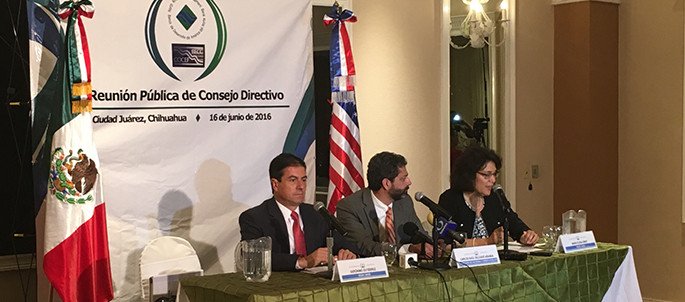NADB-BECC Board of Directors approves 7 new environmental projects

- Loan increase approved for desalination plant in Ensenada, B.C.
- Memorandum of Understanding between NADB and the Inter-American Development Bank announced
Ciudad Juárez, Chihuahua – During its semi-annual meeting, the Board of Directors of the Border Environment Cooperation Commission (BECC) and the North American Development Bank (NADB) approved seven new environmental infrastructure projects in the water and solid waste sectors that altogether represent a total investment of close to US$15 million. These projects will benefit more than 514,000 residents in 14 communities on both sides of the U.S.-Mexico border. The Board recognized the capacity of the NADB-BECC programs to help make high-impact, environmental projects viable by providing grants, loans and technical assistance.
The Board noted progress from the U.S. and Mexican governments with regard to their respective domestic review processes to conclude the amendments to the NADB-BECC charter formally merging the two institutions. Upon completion, the merger will herald a new era for these important binational organizations.
Among the projects approved today, the North Alamo Water Supply Corporation will receive a US$1.89 million grant through the Border Environment Infrastructure Fund (BEIF), which is funded by the U.S. Environmental Protection Agency (EPA), for the implementation of a wastewater collection and treatment project in Hidalgo County, Texas, which will provide firsttime access to sewer services for 400 homes in six colonias.
The other six projects will receive grants totaling US$2.60 million through NADB’s Community Assistance Program (CAP), including a water system improvements project in Tombstone, Arizona in order to reduce arsenic concentrations to the maximum permitted level for this community of 1,380 residents, and five solid waste projects for the purchase of equipment in two communities in Coahuila and three in Chihuahua. Through these five projects, up to 557 metric tons of solid waste per day will be disposed of in properly operated landfills, benefitting more than 511,400 residents.
Additionally, a US$9.6 million loan increase was approved for the desalinization plant in Ensenada, Baja California, that is currently under construction.
A progress report was also presented on the first public transportation project financed by NADB for the purchase of low-emission buses in the Mexican border region. To date, US$7.2 million has been disbursed to finance the purchase of 58 units in three border communities: Hermosillo, SON; Tijuana, B.C.; and Ciudad Juarez, CHIH. Public transport companies in other communities are expected to take advantage of this initiative in the near future.
Additionally, the Board reviewed the impact of several wastewater infrastructure projects completed between 2002 and 2014 in the cities of Mexicali, Tecate, Playas de Rosarito and Tijuana, B.C. These projects were financed through BEIF, funded by EPA, or through NADB loans. In those communities, the population connected to the wastewater system in the project areas increased from 0 percent to close to 100 percent, along with the corresponding elimination of septic tanks and latrines. As a result, residents are enjoying better living and health conditions, with gastrointestinal diseases decreasing between 16 and 33 percent in three of the municipalities. It is important to note that, based on the survey, the perception of improved quality of life was 95% in Tijuana, 91% in Rosarito, 94% in Tecate and 90% in Mexicali. NADB and BECC plan to increase their use of impact assessments to evaluate improvements in the environment and the quality of life of residents deriving from their projects.
Within the framework of the meeting two BEIF grant agreements were signed. The first for US$7 million was contracted with the water utility in Reynosa, Tamaulipas to improve the city’s wastewater collection system and increase treatment coverage to 100% of the city. The second agreement for US$2.8 million was executed with the City of Anthony, New Mexico to replace a lift station, which will eliminate the risk of sewage spills in a populated area.
Finally, NADB and the Inter-American Development Bank (IDB) announced the signing of a Memorandum of Understanding to explore opportunities for cooperation and collaboration in areas of mutual interest, and in particular to facilitate the knowledge transfer of the methodological tools developed by IDB through its Emerging and Sustainable Cities Initiative (ESCI) for identifying, prioritizing and supporting financial structures for actions and projects related to environmental, urban, governance and fiscal sustainability in different areas of the Mexican border region. Verónica Zavala Lombardi, the IDB representative for Mexico, and NADB Managing Director Gerónimo Gutiérrez formally exchanged notes indicating the executed agreement was in effect.